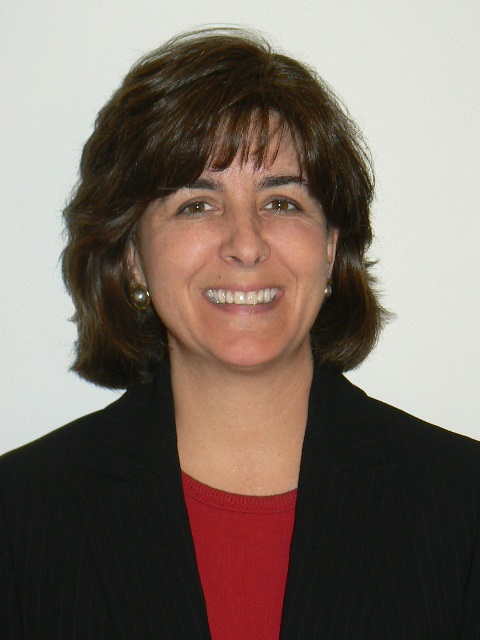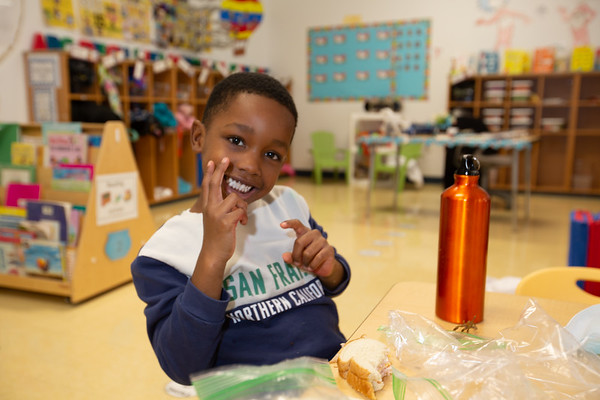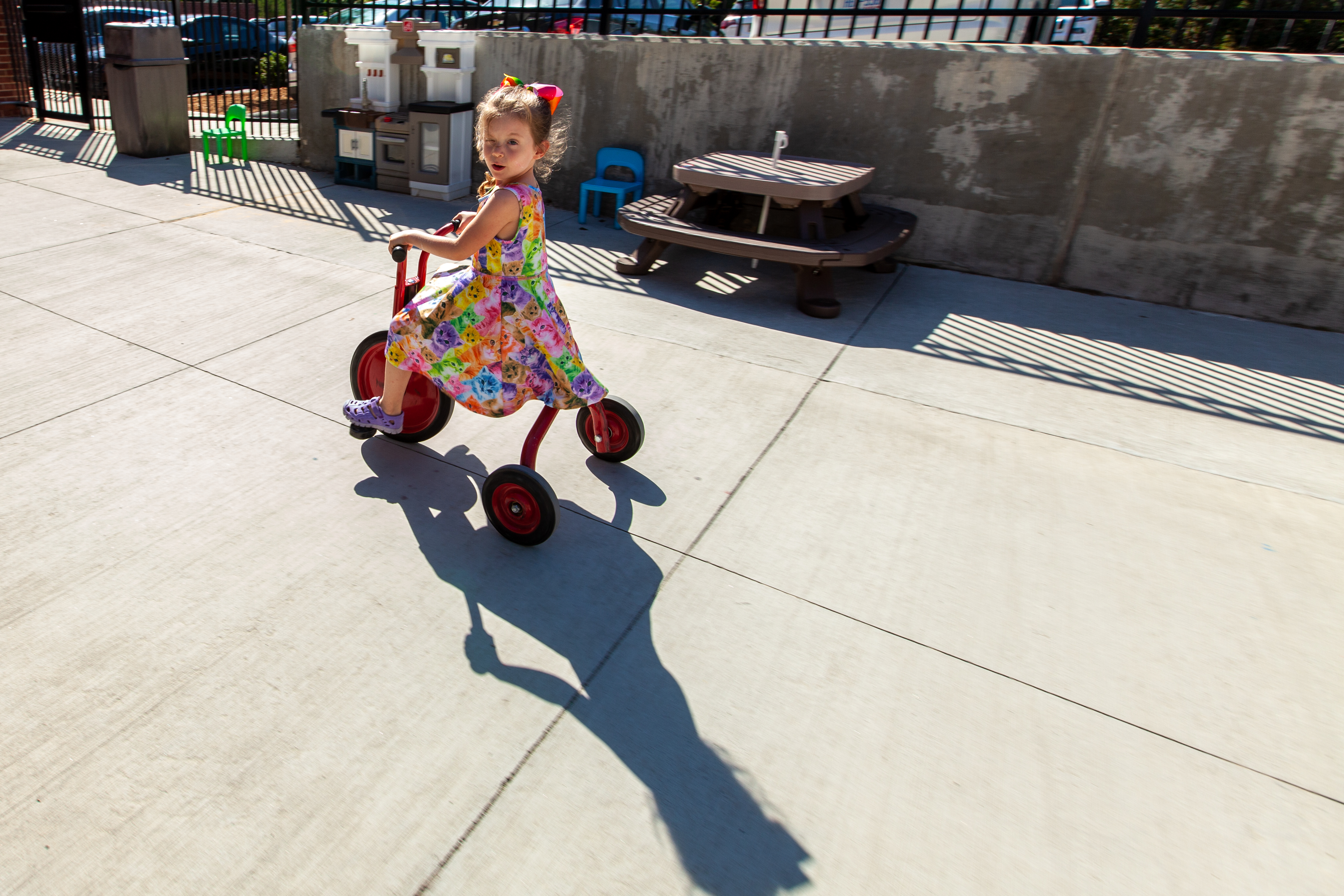Durham PreK Governance Leadership Interview with Leigh Bordley
September 29, 2022
Interview conducted the afternoon of Tuesday, February 8, 2022
 How long have you been a member of the Durham PreK Governance Committee and how did you come into your leadership role?
How long have you been a member of the Durham PreK Governance Committee and how did you come into your leadership role?
At least 5 years, and I’m currently the vice chair. I was asked to step into that role, and I believe so strongly in the mission of this effort that I'm willing to do anything I'm asked.
You’ve spent your career working on social justice issues that directly impact Durham's families and children. Can you speak to how your long-term dedication to Durham's youth is connected to your service to Durham PreK?
I have done a number of different things over the course of my career, and I think it was primarily my experience of founding and then running a mentoring program for teenagers, which was called Partners for Youth and became Partners for Youth Opportunity before it was absorbed by the Durham Children's Initiative. My experience of working with teenagers for 13 years and working to help them complete high school and make post-secondary plans that really brought me to early childhood education. Many of our students were successful. I'm really proud of the work that we did there and the work the students did. I became increasingly aware of the fact that, had we worked with those students at a younger age, we could have accomplished more, and I am convinced that early childhood education is the place in which we can have the greatest impact.
I can see that connection and imagine that it feels like a strong one for you. You said you realized that if you'd been able to work with those same kids earlier you could have done even more, and they might have benefited even more. How did you come to that realization?
Oh, I can remember a couple of different students. We had students who did everything right – graduated from high school, first member of their family to go to college, graduated from college – amazing achievements. But they never had the mental health and emotional grounding to believe in themselves, so they still ended up having children very early or without support and accepting low-wage jobs. Even though they were able to achieve these goals, they were just unmoored in their sense of self-esteem. It's really hard to repair a young person or adult’s sense of self, and that’s formed when children are young. That’s just one example of how young people who, had they been able to build their resilience and sense of self-esteem earlier in life, their situation would be different.
I think that there are a lot of young adults who haven't developed their social and emotional skills to the extent that they have the soft skills to operate in an academic environment and certainly not in a professional environment. While my program made many efforts to support kids, focusing on these changes of status, such as high school graduation and attending college and enrolling in the military or whatever, it's really hard for people to succeed in those roles if they don't have the social-emotional grounding that allows them to work with other people and to have a realistic sense of their own strengths and weaknesses. Those are just things that are formed very early in life.
As I was looking at information about your career, I noticed that your social justice interests included education, child development, immigration, and racism. Can you speak to how these areas of social justice intersect with your vision for Durham PreK?
Racism is the issue that, when I began my career, I was specifically focused on and other things have grown out of that. I see that as the place where they all intersect. If we can create a system of high-quality early childhood education for children, regardless of their economic status, race, immigration status, etc. then we have a real possibility of creating a community that is just. We can't stop at early childhood education, because that's just the first step. We still have to look at more systemic issues that continue to affect children throughout their lives. But without that, I don't think that any of the systemic solutions can succeed, because we have to have adults who can step into our community and take advantage of the equitable systems that we were trying to create.
I hear you talking about Durham PreK as the foundation or even the seed from which a healthier community is grown.
Perfect. Love those words. That’s it. That’s the ground level.
 What do you see as the greatest challenge to Durham's universal preschool program? And then what are the avenues available to address that challenge?
What do you see as the greatest challenge to Durham's universal preschool program? And then what are the avenues available to address that challenge?
I’ve thought about this one. I think the greatest challenge for us will be to create a system of high-quality programs for children. It's really tempting for people when they're faced with a scarcity of resources to try to stretch those resources and compromise on quality. We know that only high-quality, evidence-based practices are effective, and if we do not hold ourselves to high standards, we will be creating a system of daycare. There's nothing wrong with daycare. I was a working parent, and it's really important, but we won't be leveraging the power of early childhood education. It's essential that we do that, so we have to resolve the resource problem. We have to resolve the barriers to parents participating, like providing transportation. We have to balance our interest in having it be accessible with an emphasis on low-income children participating with building a system that's going to sustain itself over time and be as integrated in terms of race and class as possible, which is ideal for children’s learning. The most important thing is that we have teachers who are capable of providing high quality experiences for the children. And that's a real challenge.
You spoke very passionately about creating spaces and classrooms that are well integrated in terms of race and socioeconomic status. Can you speak a bit more to how and why that is so important to Durham PreK?
That's important to me on a couple of different levels. It's important to me as a person who attended public schools in Chapel Hill in the 70s and 80s, when the schools were integrated – not that they were perfect; they had problems, and the achievement gap was present – but we know through research that integrated settings provide the best possible environment for children across the spectrum. Children get the best experience. I'm so eager to have the lower-income children have access that it took the group to remind me we really need to not have this be a program just for low-income children because we're not going to be able to sustain the political will to fund and support the program over time if it's not a community wide asset. We need the community to pay for it and to participate. I'm convinced through all my experiences that that is the way to go, the way it happens, and the way it lasts.
What you said sounded like, basically, if you accept a lack of resources, you dilute the whole program over time, and it cannot reach the heights that you need it to, so you prioritize those resources and feed them into the pieces of the program that matter the most.
Yes. That's true. That's implied.
I wanted to follow up on the teacher piece that was the last thing you mentioned. You talked about finding those highly qualified teachers and placing them. Every industry is struggling, but certainly early childhood is struggling with staffing right now, and I know that the degree programs for early childhood education are struggling even to have teachers coming through the pipeline. So is that the most urgent issue or are there potentially more urgent issues to address first?
I don't think we have the luxury of taking the issues on one by one because we have to be able to juggle these at the same time. I would say certainly a heavy emphasis has to be placed on prioritizing funding to attract and maintain and support teachers. It’s not just that we find good teachers and give them a wage and a cost of living adjustment every year. To keep them we also have to continue educating them and supporting them as professionals. It's expensive, but somewhat cheaper than not doing it when we look at what happens to humans if they don't have these experiences and what our community pays for that. So, yeah, I think we have to make that happen. We have to make that happen.
 What is the greatest promise Durham PreK holds for both Durham's children and for the larger early childhood field?
What is the greatest promise Durham PreK holds for both Durham's children and for the larger early childhood field?
This is a hard one because I really wish that our federal government and specifically our state were paying for the work that we're doing in Durham PreK. I think the work that we're doing is just a powerful, tangible proof of what we're willing to do to support our children in our community. We’ve asked the state, we waited for the state, we prayed about the state paying for it. They're not doing it, so here we go. I know the children who are participating are too young to appreciate that right now, and that's not the point. But I hope in some way their families feel that we're with them, and that our community truly cares about the success and the welfare of their children and their family. I think that we can be and I hope that we are that within Durham, and I hope that we can be inspiring and provide practical technical assistance to other communities who might be in similar situations. Durham is in a unique situation, I realize, because we have many more resources than a lot of our other counties in North Carolina that are also underfunded by the state. But if there are other places, and I know there are a few, that can begin to imagine something like this, I hope that we can be part of helping them do that and helping kids in other locations, as well.